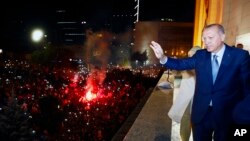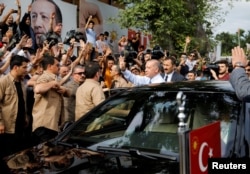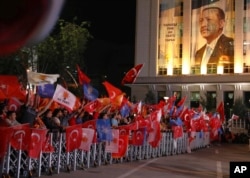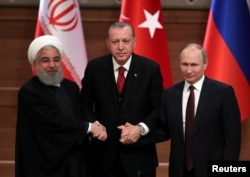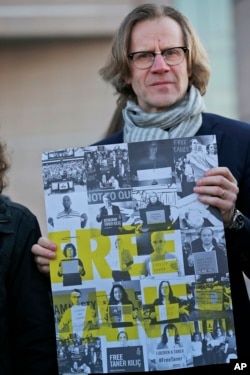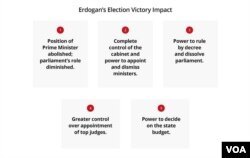Despite Turkey’s economic woes, many Turks who voted Sunday for Recep Tayyip Erdogan see him as the architect of recent boom years that have seen massive improvements in their standard of living.
Turks who voted for him say they trust him to lead Turkey through current turbulent economic times back to recovery and to continue to position the country as a powerful player on the world stage. They also approve of his championing of Muslim causes, say analysts.
The re-elected Erdogan struck a combative tone in his victory speech before a crowd of thousands in Ankara. From the balcony of the headquarters of the AKP, he led his supporters in chanting, “One nation, one flag, one country, one state.” Erdogan promised to press on with his “reforms” and to increase Turkish influence.
“Turkey has no moment to waste, we know that,” he said.
He vowed to “fight decisively” against Turkey’s enemies at home and abroad. He signaled a renewed military drive against Kurdish militants in southeast Turkey. “We never bow down in front of anyone except God,” he declared.
Analysts expect him to use his powers to the full and forecast even more dissenters, and those suspected of disloyalty, will be dispatched to jails to join the tens of thousands of former officials, Kurdish activists, and journalists who have been filling the country’s prisons since the 2016 abortive military coup against him.
“Erdogan’s preference for sticks over carrots in domestic politics will continue,” forecasts commentator Abdullah Bozkurt. “His first order of business will be making sure there is no backlash against his rule,” he predicts.
“With direct control over the security forces, both police and military, Erdogan can easily squelch any potential unrest in the coming days,” he argued.
Other analysts say they expect Erdogan’s election win to push some dejected opponents to throw in the towel and to accept government patronage, but much will depend on how Turkey weathers its economic challenges.
Overseas reaction
In neighboring war-wracked Syria, an Erdogan win won’t displease President Bashar al-Assad, say analysts. Although Erdogan backed the uprising against Assad, the Turkish leader’s priority in Syria has switched from regime change to boxing in Syrian Kurdish forces, which he sees as an extension of Turkish Kurdish separatists.
Russian President Vladimir Putin wasted no time congratulating Erdogan on his re-election.
“The head of the Russian state stressed that the outcome of the vote fully confirms Erdogan’s great political authority, broad support of the course pursued under his leadership towards solving vital social and economic tasks facing Turkey, and enhancing the country’s foreign policy positions,” according to a Kremlin statement.
Warming up to Russia, Iran
Erdogan and Putin have enjoyed warming ties in recent months, a development that’s alarmed NATO and made it question whether Turkey is a reliable friend.
On a personal level, U.S. President Donald Trump and Erdogan are said by American officials to get along. But U.S. lawmakers have been blocking the sale of F-35A fighter aircraft to the Turkish air force.
The lawmakers are angered by Turkey’s intervention in northern Syria against the Kurds, American allies in the fight against the Islamic State terror group, as well as a purchase by Erdogan of Russian S-400 anti-aircraft missiles.
Pentagon officials have also expressed frustration with signs of an Erdogan rapprochement with Iran.
Last week, members of the U.S. Congress issued an open letter criticizing Erdogan.
“Contrary to its NATO obligations, Turkey is actively operating to undermine U.S. interests around the world. Turkey’s repeated military actions against American interests, relentless degradation of human rights and democracy under President Erdogan, and clear intention to build a strategic partnership with Russia have completely eroded the U.S.-Turkey relationship,” they said.
Other issues
For Western powers Erdogan’s burgeoning relationship with Putin isn’t the only worry. Brussels has repeatedly clashed in recent years with the Turkish leader over human rights and rule-of-law issues, his counter-insurgency operations against Kurdish militants, and his moving Turkey away from secular political traditions. But the European Union has had to balance its disapproval with its need for Turkish assistance on the migration crisis and counter-terrorism.
But Turkey is a NATO member and Washington has needed Ankara’s assistance in the fight against IS in Syria and Iraq, and the use of the Incirlik airbase in southern Turkey.
In a Brookings Institution report earlier this year, analyst Amanda Sloat noted the West has a “Turkey conundrum."
“What makes the country such a conundrum is that its problematic leadership faces real threats," she said. "Turkey is confronting challenges from the aftermath of the July 2016 coup attempt and the destabilizing effects of the Syrian war. Yet the country’s president is growing more authoritarian, using virulent anti-Western rhetoric, and making foreign policy choices contrary to the interests of the trans-Atlantic alliance.”
Former Turkish lawmaker Aykan Erdemir says the elections will likely complicate relations with the West. Now an analyst at the Foundation for the Defense of Democracies, a policy research group in Washington, he says with Erdogan dependent on the far-right Nationalist Movement Party (MHP) for his majority in the parliament, hardline nationalism will be even more to the fore.
“Turkey's nationalist Zeitgeist will further undermine relations with the European Union and the U.S, and put Ankara on a crash course with the transatlantic alliance,” he said.




